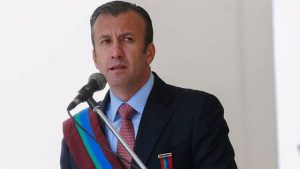
Venezuela’s Vice President Tareck El Aissami isn’t losing any sleep over the issue
CARACAS, Venezuela, Friday February 17, 2017 – Venezuela’s Vice President Tareck El Aissami has dismissed US sanctions identifying him as an international drug kingpin, saying that the move by the Trump administration only deepens his commitment to the anti-imperialist revolution begun by the late Hugo Chavez.
In a raft of defiant social media posts, El Aissami said that what he described as the “miserable and defamatory aggression” by the US would not distract him from his job of rescuing Venezuela’s economy from “sabotage by its conservative opponents.”
“They’ll never be able to defeat our unbreakable resolution to be free forever,” he said on Tuesday.
The previous day, the Trump administration had frozen the US assets of El Aissami and banned him from entering the US for his alleged role in facilitating the shipment of multiple tons of cocaine from Venezuela.
As the highest-ranking Venezuelan official ever to be sanctioned by the US, El Aissami’s designation as a drug kingpin is sure to escalate tensions between the two countries, which have not exchanged ambassadors since 2010.
The 42-year-old vice president has been the target of US law enforcement investigations for years, ever since his days as interior minister when dozens of fraudulent Venezuelan passports ended up in the hands of people from the Middle East, including alleged members of Hezbollah.
Prior to his extradition from Colombia in 2011, Walid Makled, Venezuela’s top convicted drug trafficker, told authorities that he paid bribes through El Aissami’s brother to Venezuelan officials so they would turn a blind eye to cocaine shipments that have proliferated over the past two decades.
While Monday’s move by the US made no mention of any ties to Hezbollah, it said that El Aissami had worked with prominent drug traffickers in Mexico and Colombia to oversee multiple US-bound cocaine shipments from Venezuela.
Also sanctioned was Samark Lopez, a Venezuelan businessman the US described as El Aissami’s primary front man, who is accused of laundering proceeds from the drug trade through a network of companies and luxury real estate properties in the US, Panama, British Virgin Islands and Venezuela.
Analysts say that whether the sanctions signal a hardening US stance toward President Nicolas Maduro’s socialist government, or is just a continuation of policies implemented by the Obama administration, remains to be seen.
Under President Obama, the US did not call for the unpopular Maduro’s removal, electing instead to support a Vatican-sponsored dialogue with the opposition, aimed at avoiding bloodshed.
Chris Sabatini, editor of Latin America Goes Global, a website that tracks US policy toward the region, nevertheless believes that patience has now worn out.
“There’s a mounting sense of frustration, even in the State Department and on the Hill, that the dialogue is going nowhere,” he said.
Sabatini also indicated that unlike previous sanctions, issued under legislation allowing Obama to go after Venezuelan officials behind human rights abuses, the latest asset seizure was carried out by the Treasury Department under two-decade-old drug kingpin legislation that in theory is driven by law enforcement investigations.
The US Embassy in Caracas, in announcing the sanctions, made no mention of El Aissami’s position in Venezuela’s government.
